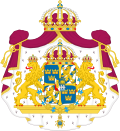| Utrikesdepartementet | |
 Arvfurstens palats, the seat of the Ministry of Foreign Affairs, at Gustav Adolfs torg in Stockholm. | |
| Agency overview | |
|---|---|
| Formed | 1791 [1] |
| Ministers responsible | |
| Website | English-language website |
 |
|---|
The Ministry for Foreign Affairs (Swedish : Utrikesdepartementet, UD) is a ministry in the Government of Sweden responsible for policies related to foreign policy, democracy, human rights, international development cooperation and foreign trade.
Contents
- History
- Government agencies and other bodies
- Areas of responsibility
- Cabinet ministers
- Ministers for foreign affairs
- Ministers for international development cooperation
- Ministers for foreign trade
- References
- External links
The ministry is currently headed by the minister for foreign affairs, Maria Malmer Stenergard of the Moderate Party.
